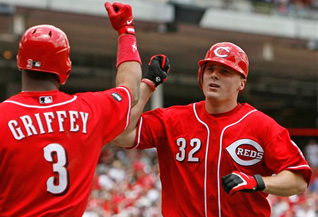|
|
Monday Morning Quarterback Part IBy BOP StaffJune 2, 2008
Reagen Sulewski: It should only be shocking that women attend movies if you are also shocked that women like to do things like drive and vote. That Hollywood executives are shocked by this is the reason that Sex and the City is a story. I don't think you can endlessly repeat this formula because of the unique branding involved, though dozens will doubtlessly try, but it was something that was inevitable for someone to stumble across. Les Winan: I never thought Big Brown/Triple Crown mania would help Sarah Jessica Parker's career so much. What great timing! I'm all for a Deadwood movie as well...I would just be concerned that they'd have to tone it down to fit the MPAA's guidelines for an R rating. David Mumpower: People have a tendency to do lazy analysis on titles like The Simpsons Movie, The X-Files and this. They wonder what the show's highest ratings were, multiple that by the cost of a ticket and view those numbers are a best case scenario for a theatrical release. In reality, it doesn't work like that. With syndication, DVD sales and VOD/Internet options, people have tons of ways to catch a show after it first airs. DVD sales in particular should not have been ignored here. Sex and the City had a box set finish in the top ten for television shows on DVD revenue three consecutive years. Ancillary success stories such as this do not get chronicled often since they don't make for sexy media cycles. I am certain information just such as this is why a Sex and the City movie was greenlighted at a $60 million budget in the first place. There was a comfort level in knowing that the film would make money on home video. Could they have anticipated beating Indiana Jones and the Kingdom of the Crystal Skull? Given that Hollywood Reporter and Variety still were not predicting it last Thursday, I doubt they would have 18 months ago. The wave did not become a tsunami until such a time as the group viewing parties idea propagated, but the built-in fan base was always much, much larger than was being acknowledged. James Wood: One thing I'd like to comment on with regard to the group dynamic is how "ring leaders" might have played a role. For example, my wife was not planning on making me go see this with her. And she wouldn't have gone to see it alone and probably didn't care about seeing it enough to take the initiative to call up a friend and make plans to see it. She would have been fine catching it on cable. However, when one of her friends reached out to her, she jumped at the opportunity to go. I think that is significant. In other words, you really only needed to convert a bunch of what I am going to call "ring leaders" who then did the legwork of multiplying that audience by three to four times. What I'm getting at is that in every group of four women who saw it, you probably only really had one woman you could have counted on to show up on opening night. and two others who were 40-60% to see it, and one who was under 40%. so, as individuals, it probably didn't look like a strong play. but a whole casual fan base was tapped into because of the group dynamic. In fact, that's probably the exact scenario I heard played out on the street. Two women didn't really care about going and would have even preferred going to see Iron Man again, but probably wound up going because their ringleader friend already bought tickets for them. Kim Hollis: I just don't understand women at all.
|

|
|
|

|
Thursday, October 31, 2024
© 2024 Box Office Prophets, a division of One Of Us, Inc.


